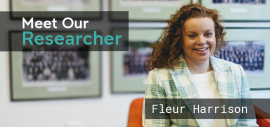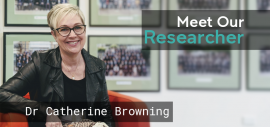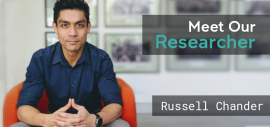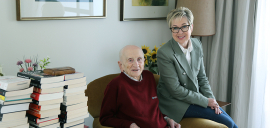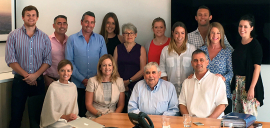Blog: The Brain Dialogues, filtered by tag: Sydney Centenarian Study
Fleur Harrison | Meet Our Researcher Series
Apathy, defined as loss of motivation leading to dysfunction or disability, is experienced by many community-dwelling older people, and is one of the most common symptoms of neurological and psychiatric disorders. It has often been mislabelled as depression, resulting in ineffective treatment, and has a significant impact on an individual’s ability to lead a fulfilling life. Through research undertaken in her PhD, Fleur Harrison, hopes to shine the light on apathy as an under-researched construct which interplays with ageing and the immune system.
How did you first get into researching… Read More
Dr Karen Mather | Meet Our Researcher Series
Dr Karen Mather’s multi-disciplinary research approach to understanding human ageing is dependent upon collaborating not only with CHeBA staff, but also national and international researchers and using publicly available data to provide a more comprehensive examination of the biological processes that underlie the rate at which we age. Dr Mather is enthusiastic about working with CHeBA’s unique studies - in particular the Sydney Centenarian Study - which is the only ongoing exceptional longevity study in Australia.
How did you get into researching the ageing brain?
Unlike most people I… Read More
Dr Catherine Browning | Meet Our Researcher Series
One of the most dynamic functions of Dr Browning’s role as Study Coordinator of the Sydney Centenarian Study is meeting with a diverse array of individuals, with undeniably more life experience than most. The study’s dataset is one of CHeBA’s richest sources of information regarding successful cognitive ageing.
How did you first get into researching the ageing brain?
It certainly wasn’t a direct path! Instead of following my passion for science when I left high school, I studied commerce part-time at UNSW and worked as an undergraduate cadet at one of the big accounting firms – done as… Read More
Julia Riches | Meet Our Researcher Series
The participants of CHeBA’s Sydney Centenarian Study have quite literally a century’s worth of knowledge and possibly the most diversified life experience of us all. Experiencing the impacts of World Wars, countless technological innovations and the unusual circumstances of a global pandemic. Their invaluable insights confirmed to Julia Riches that CHeBA was the place to be.
How did you get into researching the ageing brain?
I completed my undergraduate studies at the University of Queensland and started working as a Research Assistant there, coincidently, on CHeBA’s Social Cognition… Read More
Russell Chander | Meet Our Researcher Series
There is a large body of evidence to suggest that our ability to socialise and maintain positive relationships throughout the lifespan is affected by, and can have an effect on, ageing. Becoming part of an international collaborative effort to better understand the impact of social skills in later life on cognitive decline and dementia is what motivates Russell Chander; PhD student at CHeBA.
How did you get into researching the ageing brain?
I became aware of a Research Assistant job through a friend from university that was working at a Neurology clinic. This would be the first job I… Read More
Tale of the Century
This article was originally published in Montefiore LIFE, Rosh Hashana 2019.
Discover more about the Centre for Healthy Brain Ageing (CHeBA) UNSW's Sydney Centenarian Study, which includes many Montefiore residents.
Every year, the likelihood of living to 100 and beyond increases. The possibility of achieving this exceptional age is on the one hand exciting – after all, throughout history, humankind has been intrigued by the fountain of youth concept. However, longevity can come with significant challenges.
The Sydney Centenarian Study led by the UNSW Centre for Healthy Brain Ageing (CHeBA… Read More
Inter-Generational Family Foundation
HEIDI DOUGLASS | h.douglass@unsw.edu.au
Multigenerational giving provides meaningful opportunities to bring family members together to support common causes, give back to communities, and create lasting change; a concept that is well understood by the Mostyn family in Sydney.
Three generations of the Mostyn family work collectively to provide funding support for valuable projects, while modelling social values to younger generations and raising awareness of community needs.
The Mostyn Family Foundation was founded by Bob Mostyn in 2011 with support of his sons Richard, Andrew and Robert… Read More
Exploiting Big Data for Dementia Research
PROFESSOR PERMINDER SACHDEV
This article was first published in InformAge, Volume 2, Issue IV December 2015 (Summer).
Dementia is a global problem, and there is a worldwide effort to identify risk and protective factors, determine early biomarkers, and develop novel treatments for dementia. A survey of the international research scene reveals that many groups are working in relative isolation on projects that are similar to research conducted elsewhere. Very often, the individual projects are not large enough to provide conclusive answers to complex research questions. A recent… Read More
Living to 100
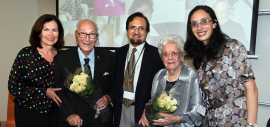
DR CHARLENE LEVITAN
Centenarians are the fastest growing age worldwide. We can learn about ageing by studying the extremes, especially those who are models of "successful ageing". So how do we live to 100 in good physical and mental health?
Approximately 30% of longevity is contributed to be our genes. Parents of centenarians live an average age of 10 years longer than the average life expectancy of the population. Centenarians are four times more likely to have a sibling in their early nineties.
The remaining 70% of ingredients relate to the our life style. Montefiore participants in the… Read More
Donating Your Brain to Research
HEIDI DOUGLASS | h.douglass@unsw.edu.au
There are currently approximately 320,000 people in Australia with dementia, with that number set to rise to almost one million by 2050, and 115 million globally. These predictions mean that not only do we need a clear plan to make care available for so many people with dementia, but we also need to pursue prevention strategies vigorously.
Prevention of dementia depends largely upon research, and beyond the necessities of funding, equipment, and academics with the right skill base to perform the research we need one extra thing: brains.
"Even before… Read More
